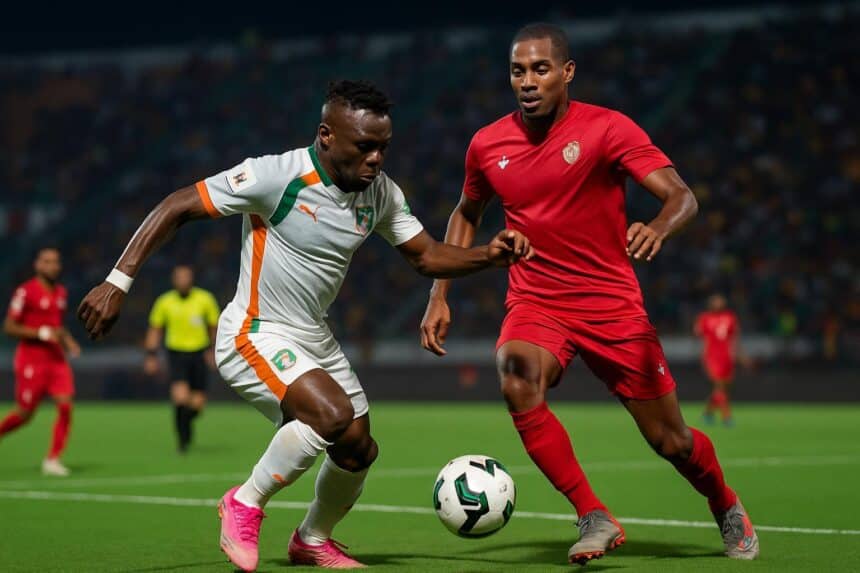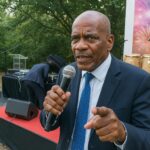Stinging defeat in Burkina Faso
Every football dream includes the possibility of heartbreak, yet few expected the Republic of Congo’s Red Devils to fall 3–1 to Niger on neutral turf at Ouagadougou, puncturing their 2026 FIFA World Cup hopes.
Coach Fabrizio Cesana’s youthful, locally based squad conceded twice before the interval and, despite a stoppage-time strike from 18-year-old forward Bassinga Déo Gracias, never truly looked capable of reversing the tide.
The setback leaves Congo anchored at the bottom of Group E with a single point from seven outings, an alarming statistic in a pool topped by Morocco, Tanzania and Zambia.
Numbers tell a hard story
Across those seven matches, the Red Devils have found the net only four times and shipped 23 goals, the worst differential among the nine African qualifying groups.
Six draws and one defeat may sound steady, yet FIFA’s new qualifying format awards three points for victory; without wins, the Congolese tally cannot climb fast enough.
Mathematically, Cesana’s men must now claim maximum points in their remaining three fixtures and hope rivals slip up, a scenario local analysts describe as “miraculous more than probable”.
Behind the scoreline, lingering tensions
Poor results rarely occur in a vacuum, and Congo’s domestic football has wrestled for years with disputes between the Ministry of Sports and the national federation over budgets, travel logistics and youth development pathways.
Administrative frictions have at times delayed salary payments, interrupted league calendars and forced the senior side to adopt “home” stadiums abroad while renovations in Brazzaville continue.
In the wake of the Niger loss, long-time supporters in capital fan clubs circulated open letters urging leaders to “talk first, sanction later”, fearing that further suspensions could strip young players of crucial exposure.
Players speak through social media
Veteran midfielder Sylver Nganvoula jokingly posted a broken-heart emoji under an unofficial highlights reel, while forward Fred Dembi questioned whether “talent alone can carry an inexperienced group on such a stage”.
Neither comment directly criticised Cesana, yet their timing fuelled debate on talk shows, with callers asking if a blend of overseas-based stars and local prospects might have offered better balance.
Cesana, speaking to Radio Congo, defended his selection as “a long-term investment matching our economic reality”, adding that airfare savings have been redirected toward upgrading training pitches outside Pointe-Noire.
Can youth projects pay off?
The Red Devils’ average age against Niger was just 22, the youngest in African qualifying, an indicator of faith in academies such as Diables Noirs and AS Otohô that have recently partnered with French Ligue 1 clubs.
Sports economist Léon Makouta argues that “a clear identity built around homegrown players could yield dividends by 2030”, citing Senegal’s two-decade rise as reference.
Yet fans balancing patience with passion still crave short-term milestones such as qualifying for the 2025 Africa Cup of Nations, scheduled in Morocco shortly before the next phase of World Cup preliminaries.
Road ahead: fixtures and possibilities
Congo’s calendar resumes in March with a trip to Tanzania, followed by June encounters against Zambia and a likely high-stakes closing duel with Morocco, whose Atlas Lions remain African heavyweights after their Qatar 2022 semi-final run.
Because only the group winner guarantees automatic qualification, and the two best runners-up enter play-offs, the Red Devils would need an unlikely sequence of victories and favourable goal swings.
Cesana insists the dressing room “has not waved any white flag” and believes the squad can play spoiler, potentially altering the destiny of neighbours who hope to represent Africa on North American soil.
Government and federation response
The federation has scheduled a training camp in Oyo next month, aiming to blend tactical sessions with community outreach programs in nearby schools and clinics.
Officials hope the presence of national stars will inspire healthier lifestyles and rebuild trust after pandemic-related disruptions kept players distant from local supporters.
Congo’s sports minister, speaking during a radio interview, reaffirmed the government’s commitment to “transparent dialogue and steady investment” so that “victories eventually match our citizens’ enthusiasm”.
Supporters keep faith alive
Despite recent frustrations, Brazzaville’s barbershops and street cafés still reverberate with matchday chatter, evidence of a population that sees football as social glue across ethnic and political lines.
Outside the Marché Total on Monday morning, vendor Lucie Tchibota waved her red-green-yellow scarf and shrugged, saying, “We suffer together, we celebrate together; maybe the next generation will surprise the continent.”
Digital creators have joined the optimism drive, launching a TikTok challenge that invites young fans to juggle a ball 26 times—one touch for each letter in “Coupe du Monde”—and tag the federation.
Early clips featuring school children outside Makélékélé have already crossed 200,000 views, underlining how hope can travel even faster than results in the smartphone era.
For now, the road to North America looks steep, yet the nation’s passion remains undimmed; as the old Congolese saying goes, “a ball keeps rolling as long as feet keep chasing”.





















